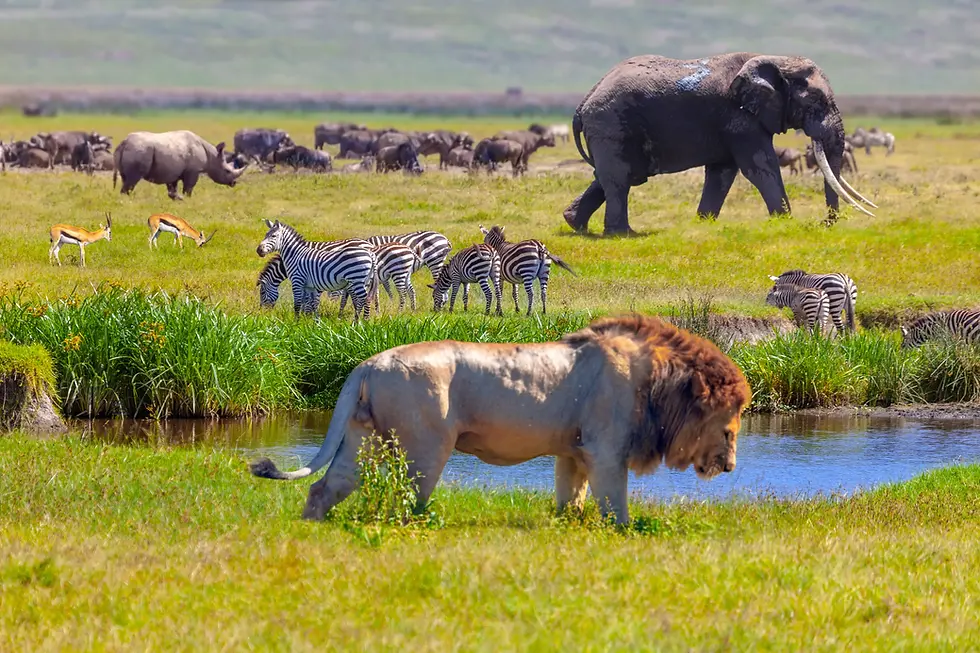We Are the Future of Marine Ecosystems
- Pooja Srikanth
- Mar 5
- 3 min read
Marine ecosystems are necessary for the functioning of our planet. Not only do they supply about half the oxygen we breathe, but they absorb approximately 31% of carbon dioxide emissions. More importantly, the fish we eat, the seafood we consume, and even that peanut butter you had on your PBJ this morning are from marine ecosystems. Some people don’t realize how valuable marine life is to humans, so they give little regard and importance to them. This is exactly why these ecosystems are suffering.
Pollution: The number one thing humans can do to prevent the tragedies of marine life experiments is preventing POLLUTION (which I’m sure many of you have heard–and are sick of). But you should never be sick of hearing that; you should recycle, reuse, and reduce. When people don’t recycle, microplastics begin to form in the ocean. It’s not enough for one person to stop, because when animals are intoxicated by improper recycling, it affects everyone in that marine ecosystem. When animals eat one another, they all begin to get intoxicated–resulting in animals dying one by one. Conservation efforts have been put in place. For example, for more than thirty years beach cleanups have been organized to ensure our oceans are clean, healthy, and animals are in their best shape.
Overfishing: Fishing practices such as bycatch catch unnecessary fish that can damage the seafloor. A damaged seafloor can result in fewer habitats for animals. In New Zealand, fisheries are attempting to reduce the amount of fish caught so animals can have their homes. We should all try to implement more rules like New Zealand to ensure that habitats are not destroyed.
Eutrophication: This is a term many are not familiar with, but it is caused by pollutants from run-off from farms and factories. Nitrogen and phosphorus from run-off can land in these waters where marine life is located. When this occurs, algae blooms start to form, which cover fishes from the sun. When this happens the photosynthesis cycle and the respiration cycle are all disrupted which could also affect humans as well. Conservation efforts such as reducing the excess flow of nutrients have been attempted but are quite complicated to install. The most common way to do this is dredging which removes nutrients from the bottom of rivers, oceans, and lakes.
Climate change (more specifically global warming): WE HAVE ALL HEARD THIS BEFORE because it just NEVER goes away. But if you're anything like me, then you probably don’t know a whole lot about climate change (more specifically global warming). For starters, climate change occurs because of the overuse of carbon dioxide emissions. The earth absorbs about ⅓ of these emissions–meaning that these marine ecosystems also consume a LOT. These emissions can affect marine animals especially those with shells, mangroves, and even coral reefs. One of the most detrimental effects of this is deoxygenation. This essentially means that oxygen consumption is greater than oxygen replenishment. This reduces marine growth rate, reproduction, and disease susceptibility, and overall causes a greater chance of death in aquatic ecosystems. Conservation efforts include governments implementing a reduction in carbon dioxide emissions. We can reduce our carbon footprint and ensure that marine ecosystems are not damaged.
Overall, marine ecosystems are necessary for humans to live, breathe, eat, and continue their lives as humans. Without marine ecosystems and marine life, we don’t have most of the things we have today. And WE ARE the reason they are being negatively affected and WE ARE the reason they'll thrive in the future. So take that next step and save marine ecosystems to save yourself in the process.
Works Cited:
“How does plastic get into the sea and how to avoid it?” Iberdrola, https://www.iberdrola.com/sustainability/how-does-plastic-get-into-the-ocean. Accessed 21 February 2025.
“Quantifying the Ocean Carbon Sink | News | National Centers for Environmental Information (NCEI).” National Centers for Environmental Information, 26 August 2022, https://www.ncei.noaa.gov/news/quantifying-ocean-carbon-sink. Accessed 21 February 2025.
“Threats to Marine Ecosystems | LEARNZ.” LEARNZ |, https://www.learnz.org.nz/sustainableseas181/bg-standard-f/threats-to-marine-ecosystems. Accessed 21 February 2025.




Comments